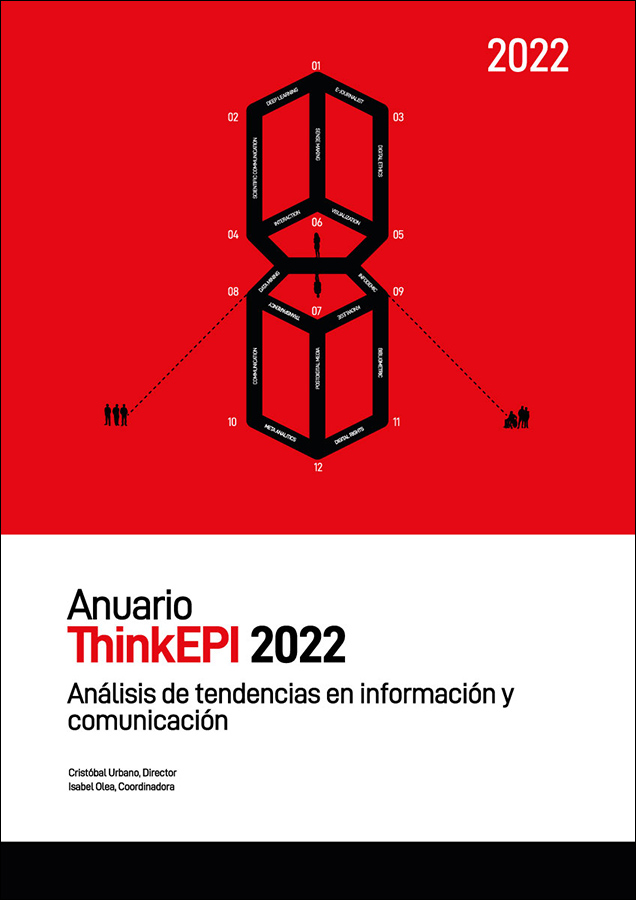A not-so-novel approach to managing scholarly communication: Applying the principles of records management to the scholarly record
DOI:
https://doi.org/10.3145/thinkepi.2022.e16a41Keywords:
Scholarly communication, Scholarly publications, Scholarly publishers, Records management, Scholarly record, Governance, FAIRAbstract
An aspect that in my view is insufficiently questioned in conversations about the future of scholarly communication is the framing of academic documents as products of a publishing industry (publications). Here, I propose that documents that serve as evidence of scholarly and scientific activities should be primarily understood as records (elements of an archive), with all that this entails. This is compatible both with the public nature of many of these documents and with the need for editing processes. The result would be a true scholarly record that is worthy of its name, something that could not exist in the past because of technical limitations. This radical shift in perspective reveals the need for academic institutions and communities to take responsibility for the governance of scholarly communication processes, a demand recently voiced by several international organizations and expert groups. The approach outlined here intends to place the management of processes in scholarly communication at the same level as any other human activity that generates documents that are considered necessary to keep supporting said activity. In other areas, responsible organizations apply the principles of records management to appraise and implement the workflows that best support the activities of the organization. This is not the case in scholarly communication, where owing to historical reasons, communication is structured around an industry in which a small number of commercial actors have eventually amassed a disproportionate amount of power, ultimately giving rise to models in which a number of sectors of the academic community are systematically excluded on economic grounds. In summary, this work argues that the digital transformation of scholarly communication points to the need for scholarly records management. Initiatives such as the FAIR principles can be framed as steps in this direction.
Downloads
References
Alperin, Juan-Pablo (2022). "Why I think ending article-processing charges will save open access". Nature, v. 610, n. 7931. https://doi.org/10.1038/d41586-022-03201-w
Becerril, Arianna; Bosman, Jeroen; Bjí¸rnshauge, Lars; Frantsví¥g, Jan-Erik; Kramer, Bianca; Langlais, Pierre-Carl; Mounier, Pierre; Proudman, Vanessa; Redhead, Claire; Torny, Didier (2021). OA diamond journals study. Part 2: Recommendations. Zenodo. https://doi.org/10.5281/ZENODO.4562790
Bilder, Geoffrey; Lin, Jennifer; Neylon, Cameron (2020). The principles of open scholarly infrastructure. https://doi.org/10.24343/C34W2H
BOAI20 Steering Group (2022). The Budapest Open Access Initiative: 20th anniversary recommendations, March 15. https://www.budapestopenaccessinitiative.org/boai20/
Chue-Hong, Neil P.; Katz, Daniel S.; Barker, Michelle; Lamprecht, Anna-Lena; Martinez, Carlos; Psomopoulos, Fotis E.; Harrow, Jen; Castro, Leyla-Jael; Gruenpeter, Morane; Martínez, Paula-Andrea; Honeyman, Tom; Struck, Alexander; Lee, Allen; Loewe, Axel; Van-Werkhoven, Ben; Jones, Catherine; Garijo, Daniel; Plomp, Esther; Genova, Francoise; "¦ Yehudi, Yo (2022). FAIR Principles for research software (FAIR4RS principles). https://doi.org/10.15497/RDA00068
Cramer, Tom; German, Chip; Jefferies, Neil; Wise, Alicia (2022). "A perpetual motion machine: The preserved digital scholarly record". Learned publishing, first online. https://doi.org/10.1002/leap.1494
Crane, Gregory; Bamman, David; Cerrato, Lisa; Jones, Alison; Mimno, David; Packel, Adrian; Sculley, David; Weaver, Gabriel (2006). "Beyond digital incunabula: Modeling the next generation of digital libraries". En: Gonzalo, Julio; Thanos, Constantino; Verdejo, M. Felisa; Carrasco, Rafael C. (eds.). Research and advanced technology for digital libraries. Springer, pp. 353-366. https://doi.org/10.1007/11863878_30
Delgado-López-Cózar, Emilio (2018). De la ruta de oro a la ruta verde de la comunicación científica: Negocio editorial y bibliometrico, publicación libre, acceso abierto, evaluación total e individualizada. https://doi.org/10.13140/RG.2.2.30852.78724
EUA (2022). The EUA open science agenda 2025. European University Association. https://eua.eu/downloads/publications/eua%20os%20agenda.pdf
Hendricks, Ginny; Kramer, Bianca; Maccallum, Catriona J.; Manghi, Paolo; Neylon, Cameron; Peroni, Silvio; Shotton, David; Tay, Aaron; Waltman, Ludo (2021). "Now is the time to work together toward open infrastructures for scholarly metadata". Impact of social sciences, October 27. https://blogs.lse.ac.uk/impactofsocialsciences/2021/10/27/now-is-the-time-to-work-together-toward-open-infrastructures-for-scholarly-metadata/
Hendricks, Ginny; Lammey, Rachael; Rittman, Martyn (2022). Towards a connected and dynamic scholarly record of updates, corrections, and retractions. MetaArXiv. https://doi.org/10.31222/osf.io/6z7s3
Martín-Martín, Alberto; Delgado-López-Cózar, Emilio (2022). "Towards a foundation of scholarly records management: A framework to understand and organise scholarly communication". In: 26th International Conference on Science, Technology and Innovation Indicators (STI 2022), Granada (Spain), 7 septiembre. https://doi.org/10.5281/ZENODO.6948200
Musen, Mark A. (2022). "Without appropriate metadata, data-sharing mandates are pointless". Nature, v. 609, n. 7926. https://doi.org/10.1038/d41586-022-02820-7
Nature (2022). "Citation data are now open, but that´s far from enough. Editorial" Nature, v. 609, n. 7927. https://doi.org/10.1038/d41586-022-02915-1
Ortega, José-Luis (2022). "Una propuesta arriesgada: hacer de los repositorios mega-journals". Anuario ThinkEPI, v. 16, e16e29. https://doi.org/10.3145/thinkepi.2022.e16e29
Pooley, Jeff (2022). "Surveillance publishing". The journal of electronic publishing, v. 25, n. 1. https://doi.org/10.3998/jep.1874
RELX (2022). RELX: The global provider of information-based analytics and decision tools. https://web.archive.org/web/20220411143831/https://www.relx.com/~/media/Files/R/RELX-Group/documents/investors/relx-overview-apr-2022.pdf
Waltman, Ludo (2020). "Publications should be FAIR". Leiden madtrics, October 26. https://www.leidenmadtrics.nl/articles/publications-should-be-fair
Wilkinson, Mark D.; Dumontier, Michel; Aalbersberg, Ijsbrand-Jan; Appleton, Gabrielle; Axton, Myles; Baak, Arie; Blomberg, Niklas; Boiten, Jan-Willem; Da-Silva-Santos, Luiz-Bonino; Bourne, Philip E.; Bouwman, Jildau; Brookes, Anthony J.; Clark, Tim; Crosas, Mercí¨; Dillo, Ingrid; "¦ Mons, Barend (2016). "The FAIR guiding principles for scientific data management and stewardship". Scientific data, v. 3, n. 1, 160018. https://doi.org/10.1038/sdata.2016.18
Downloads
Published
How to Cite
Dimensions


